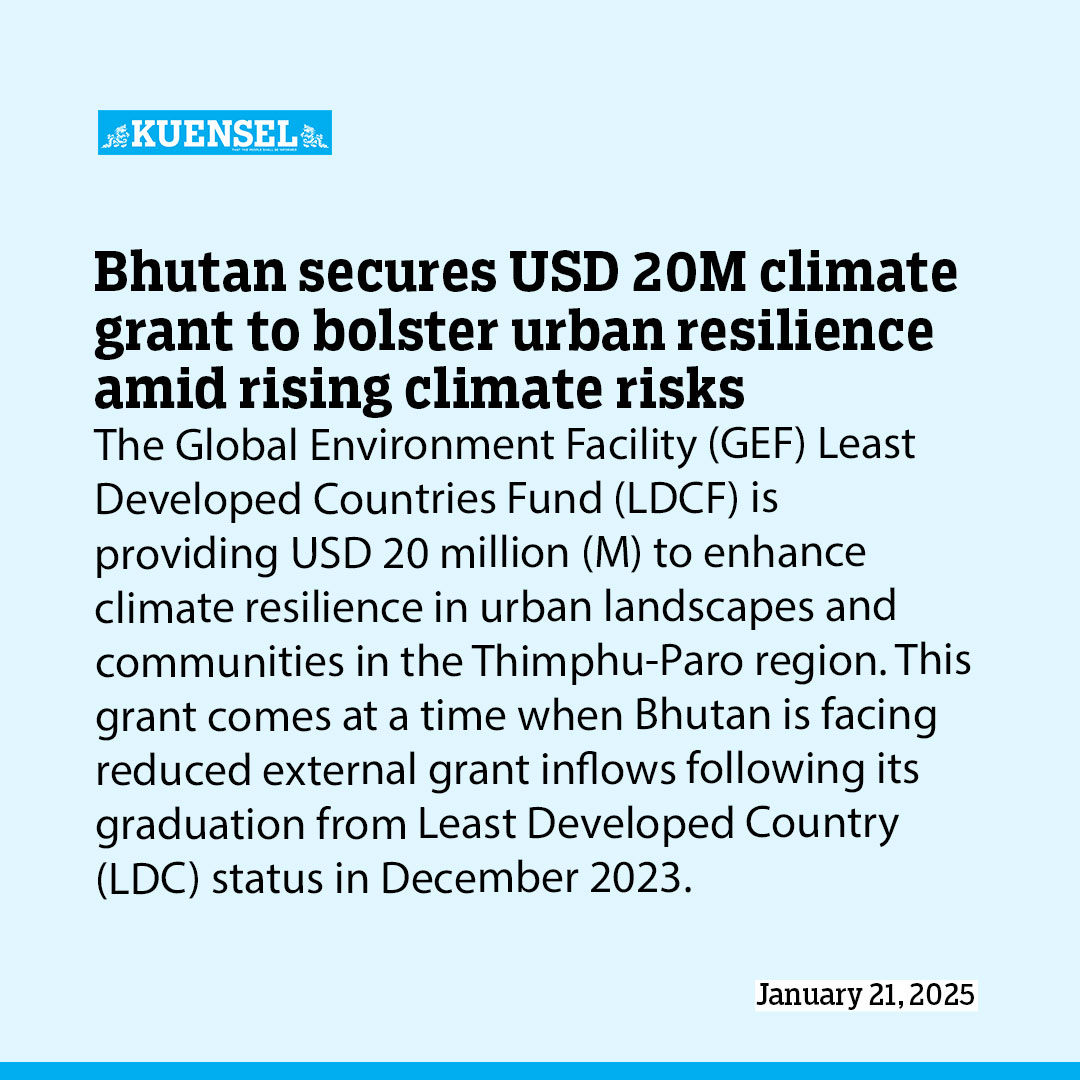Yangyel Lhaden
The Global Environment Facility (GEF) Least Developed Countries Fund (LDCF) is providing USD 20 million (M) to enhance climate resilience in urban landscapes and communities in the Thimphu-Paro region.
This grant comes at a time when Bhutan is facing reduced external grant inflows following its graduation from Least Developed Country (LDC) status in December 2023.
External grants dropped to Nu 10.62 billion in 2023-24, a 26 percent decrease from the previous fiscal year, mainly due to reduced funding from multilateral agencies.
Despite being a carbon-negative nation, Bhutan is already experiencing the impacts of climate change, requiring urgent adaptation and mitigation measures.
According to the Nationally Determined Contribution (NDC) report, Bhutan requires USD 0.385 billion for adaptation and USD 0.6 billion for mitigation in the short term.
An official from the Ministry of Infrastructure and Transport (MoIT) said that although the fund was mobilised now for the project, it was assessed and approved before Bhutan’s LDC graduation.
The project, titled Enhancing Climate Resilience of Urban Landscapes and Communities in Thimphu-Paro Region (ECRUL), will be implemented from this year until 2030.
This project aims to implement innovative, nature-based solutions to mitigate climate change-induced risks, focusing on restoring 800 hectares of watershed and spring shed land, upgrading early warning systems, and enhancing stormwater management infrastructure to strengthen the resilience of the country’s urban landscapes and communities in the Thimphu-Paro region.
Thimphu and the neighbouring district of Paro are home to a quarter of the country’s population and contribute over 40 percent of its Gross Domestic Product. However, rapid urbanisation, combined with climate change impacts such as flooding, landslides, and water scarcity, threatens their resilience.
Existing infrastructure is not adequately designed to withstand climate shocks, leaving these cities highly vulnerable. These challenges are further exacerbated by a growing urban population, which places additional strain on existing systems.
Addressing these risks requires urgent action through nature-based solutions, resilient urban planning, and climate-proof infrastructure development.
The project will be implemented by the MoIT in partnership with UNDP and will directly benefit over 146,000 residents.
The government has committed more than USD 62M to the project, with funding from the 13th Plan for Paro and Thimphu in the form of human resources, goods, and services.
“Bhutan has experienced rapid urbanisation in recent decades, making climate resilience in our growing cities increasingly critical amid more frequent and severe climate events,” Secretary Karma Wangchuk of the MoIT said. “The ECRUL project is a significant step toward enhancing the resilience of urban landscapes, aligning with Bhutan’s NDC under the Paris Agreement and the National Adaptation Plan adopted last year.”
He said that strengthening water management, disaster preparedness, and integrating climate resilience into urban planning would address key national priorities. “MoIT is hopeful that the ECRUL project will drive a transformative shift towards integrated, coordinated, and climate-resilient urban planning and development in the country.”
Carlos Manuel Rodríguez, CEO and Chairperson of the GEF, said that despite Bhutan’s status as one of the world’s only nature-positive, carbon-negative countries, Bhutan faced serious threats from the impacts of climate change.
“We are proud to support the Government of Bhutan’s efforts to address these impacts in the two most populous urban centers in the country—efforts that we believe will ensure community resilience to climate change while safeguarding the nation’s development progress and contributing to the philosophy of Gross National Happiness,” he said.
UNDP resident representative, Mohammad Younus, said: “This project, specifically targeted towards enhancing urban resilience, builds on our longstanding partnership with the Government of Bhutan in the areas of climate change, mitigation, and adaptation. It reflects our commitment to creating sustainable and resilient urban spaces while safeguarding the natural environment.”
He added that with GEF LDCF support, Bhutan could pioneer nature-positive solutions that benefit not only the country but also serve as a model for other developing nations.
Mohammad Younus said: “By advancing inclusive planning, implementing innovative climate technologies, and fostering partnerships, the ECRUL project is set to generate valuable knowledge and lessons for replication across Bhutan and beyond. As one of the fastest urbanising countries in South Asia, Bhutan’s proactive approach to addressing climate risks marks a critical step in building a sustainable future.”
Bhutan ranks 38th among the most vulnerable countries to climate change threats but lags at 62nd in preparedness, according to the State of Climate in Asia Report 2023.
While Bhutan has achieved better scores in observation and forecasting, it continues to face challenges in warning systems, dissemination of information, and disaster preparedness, highlighting the urgent need for action.


